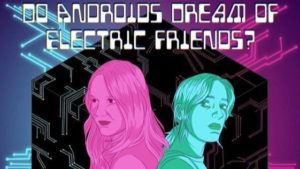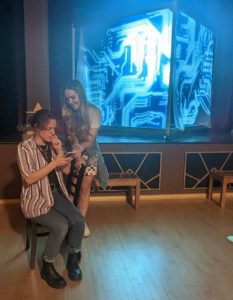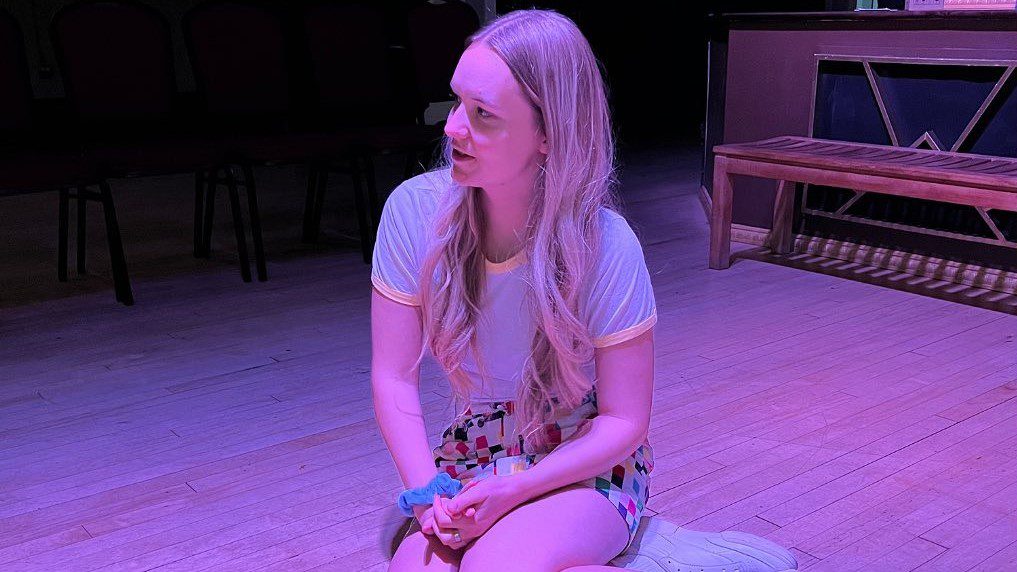PROVO — There is a special place in my heart for experimental theatre pieces. They are a glorious deviation from the overdone Utahn golden age classics. Local experimental productions are exhilarating and thought provoking as interesting artists inhabit intimate spaces with their unique, creative brilliance. Many experimental theater pieces include an intoxicatingly wonderful amount of audience interaction, and this show is no exception. Winning my personal award for most intriguing title of a play, Do Androids Dream of Electric Friends? from Robot Roommate Company is a stimulating delight that leaves me curious for more.

An ode to millennials, new technology, vulnerability, and with a hat-tip to starving artists, Do Androids Dream of Electric Friends? is a modern-day slice of life story that follows two female roommates struggling to pay rent. When the actor decides to sign-up for a “fun robot friend project” and brings home an AI trial placement in order to earn a large paycheck, the guarded, engineer roommate is hardly enthused. As the roommates must “log” their daily routines and emotions, the AI begins to learn from them. There are very few shows that I wish were longer, but this one-hour, multimedia theatrical experience kept me on my toes. Why? Because the audience is the AI.
 Written and directed by Mariah Eames and her two actors, the show is immersive and realistic. Due to this collaborative writing process, the script features delightfully textured characters whose remarks are filled with rich, personal details that add so much life to the production. The audience sits on three sides and Eames’s direction holds their attention by moving her actors frequently and flawlessly, transitioning them in an almost musical-like manner from speaking to the AI audience members or checking their phone.
Written and directed by Mariah Eames and her two actors, the show is immersive and realistic. Due to this collaborative writing process, the script features delightfully textured characters whose remarks are filled with rich, personal details that add so much life to the production. The audience sits on three sides and Eames’s direction holds their attention by moving her actors frequently and flawlessly, transitioning them in an almost musical-like manner from speaking to the AI audience members or checking their phone.
The rest of the creative team is nothing short of brilliant. Sophie Téllez on graphic design, Jonathan Shai Van Sickle on filmography, Matthew Kupferef on sound and set design, and Melissa Longhurst on lighting design immerse the audience into the lives of these roommates and their AI, using various forms of media to create stimulating visual images and robotic auditory tones. My favorite feature is the projections, creating compelling silhouettes of the actors while combining impressive, sometimes jarring digital images representing the current state of the AI.
Esther Pielstick as “Engineer” and Claire Eyestone as “Actor” have a natural chemistry and elasticity as actors that creates a captivating performance. Both produce real, tangible emotions as they look directly into the eyes of various audience members, often improvising with them on the spot. Pielstick especially has the opportunity to produce an especially vulnerable moment, which is a gift to witness in such a close, intimate space. These actors build the momentum of the plot beautifully through their relationship so that when the ending comes (and it comes faster than I would like it to), I was eager to know what happens next because I had become so emotionally attached to the characters.
This show is a treat for Utah audiences. This multimedia, sensory production is excellent for all ages, old and young. It is a beautiful snippet of the intriguing joys of experimental theatre, and I am excited to see how this piece evolves. Do Androids Dream of Electric Friends? seems like an excellent starting point for something excitingly innovative and brilliant. I will be keeping an eye out for pieces by this talented production team in the future.
[box]The Robot Roommate Company production of Do Androids Dream of Electric Friends? will have its final two Utah performances on August 4 at 6 PM and 8 PM at Dry Bar Comedy (295 West Center Street, Provo). Tickets are $7. To find out more, visit www.robotroommate.com.[/box]

